| Srl | Item |
| 1 |
ID:
134077
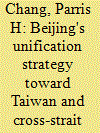

|
|
|
|
|
| Publication |
2014.
|
| Summary/Abstract |
For almost a decade, Beijing has pursued a "soft" approach toward Taiwan, cultivating economic ties and political exchanges in its pursuit of reunification. Following the end of President Chen Shui-bian's term in office, which was marked by constant tensions and several crises with China, Beijing has colluded with his successor, Ma Ying-jeou to pursue a policy of economic integration with the mainland. Beijing's
strategy toward Taiwan under Chairman Xi Jinping and his predecessor Hu Jintao has yielded positive results. The approach not only avoids possible military conflict with the United States, but receives support from Washington. Beijing's economic means, such as the Economic Cooperation Framework Agreement (ECFA), have enhanced Taiwan's economic integration with China and greatly increased the
PRC's control over Taiwan's economy and society, helping to lock Taiwan into the mainland's orbit. Likewise, Beijing has developed tools that allow it to intervene directly in Taiwanese domestic politics. However, efforts to use ties with President Ma to bring Taiwan farther into the PRC orbit have backfired, resulting in a weakened presidency that cannot deliver Beijing's goals. Thus, Beijing appears to be looking ahead to the next two elections, trying to make as much progress as possible before Ma leaves office, while simultaneously trying to establish ties with possible successors and the opposition DPP. In 2012, Beijing's intervention assisted the reelection of President Ma. It is sure to try again in Taipei's mayoral election in 2014 and the presidential/parliamentary elections in 2016.
|
|
|
|
|
|
|
|
|
|
|
|
|
|
|
|
| 2 |
ID:
093134
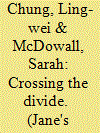

|
|
|
| 3 |
ID:
167506


|
|
|
|
|
| Summary/Abstract |
Since Ma Ying-Jeou assumed presidency in 2008, he promoted an Economic Cooperation Framework Agreement (ECFA) and Taiwan’s political rapprochement with China. However, the opposition party soon proposed a counter argument, claiming this agreement might produce severe negative consequences for Taiwan’s economy and sovereignty.
This study presents a securitization framework to highlight both the KMT and DPP strategy in contesting the nature of ECFA despite the potential inflation of benefit. It investigates both the KMT and DPP securitization strategies under Taiwan’s political and economic contexts. A de-securitizing discourse, though might have been a convincing counterargument against ECFA, was underdeveloped by the DPP members. It also shows how the debate shapes the discourse in the Sunflower Student Movements in 2014, and led to the DPP’s subsequent change of securitization strategy.
|
|
|
|
|
|
|
|
|
|
|
|
|
|
|
|
| 4 |
ID:
106724
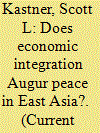

|
|
|
|
|
| Publication |
2011.
|
| Summary/Abstract |
At the end of the day, it is not clear that economic ties will act as a significant constraint on state behavior when high-stakes issues are on the table.
|
|
|
|
|
|
|
|
|
|
|
|
|
|
|
|
| 5 |
ID:
118514
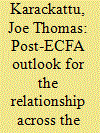

|
|
|
| 6 |
ID:
126632
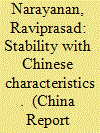

|
|
|
|
|
| Publication |
2013.
|
| Summary/Abstract |
Even as Xi Jinping begins to make his personal imprint on Cross-Strait relations, he has to contend with his predecessor, Hu Jintao's policy towards Taiwan that generated a modus vivendi, acting as a precursor to a slew of trade related agreements between the two sides leading to the ECFA in 2010. On Taiwan, the 'status quo' aspect of Cross-Strait relations has assumed overwhelming consensus with calls for deeper economic engagement with the mainland. Broadly, a template with its own characteristics emerges of a selective reconciling of differences with certain accommodations of interests making the Cross-Strait relations a unique model. This article situates Cross-Strait relations during Hu Jintao's term from 2002-2012, and advances the proposition that the mechanics of an eventual integration are underway with deeper economic cooperation being the first phase of a comprehensive framework under construction. To Beijing, its behaviour on Cross-Strait issues is intrinsic to its announced process of 'peaceful development'. However, the 'relative' success of the on-going process of economic integration does not have to be interpreted as an overwhelming endorsement of the methodology adopted, since closer relations with the mainland is a deeply divisive and politically charged issue in Taiwan
|
|
|
|
|
|
|
|
|
|
|
|
|
|
|
|
| 7 |
ID:
100654
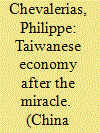

|
|
|
| 8 |
ID:
116674


|
|
|
| 9 |
ID:
108355


|
|
|
|
|
| Publication |
2011.
|
| Summary/Abstract |
Why did the unified government led by Taiwan's president Ma Ying-jeou experience gridlock? In this article, I answer this question by modifying the veto player theory to explain how policies are made in Taiwan's semipresidential system, in which the president can unilaterally appoint a premier who is accountable to the national legislature. Given this constitutional design, the premier represents the president rather than the legislature, so the agenda setter is either the legislature or the president. A veto player model shows that the legislature, as a collective veto player, has the last-mover's advantage when it sets the agenda and that the two executive heads are more likely to be in congruent if a policy has to be deliberated by the legislature. The president sets the agenda only if he can discipline the legislators in his party and the legislature is not allowed to amend an executive proposal. This theory explan is why policies involving lawmaking give Taiwan's Legislative Yuan considerable bargaining powers, even to the disadvantage of the president. These theoretical arguments are confirmed by hypothesis-based case studies and can be generalized to study other semipresidential regimes.
|
|
|
|
|
|
|
|
|
|
|
|
|
|
|
|